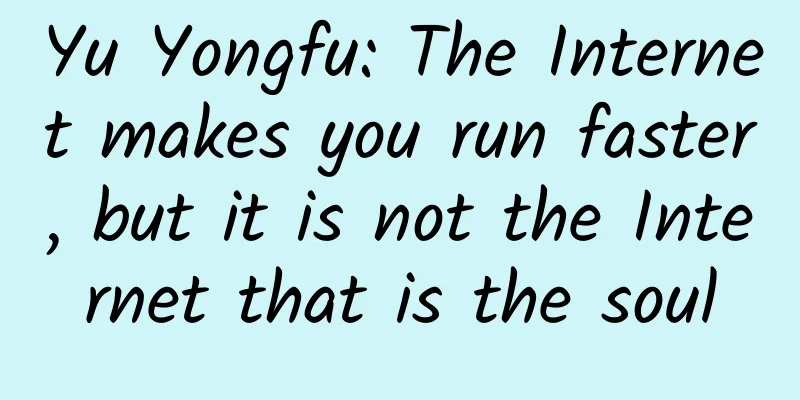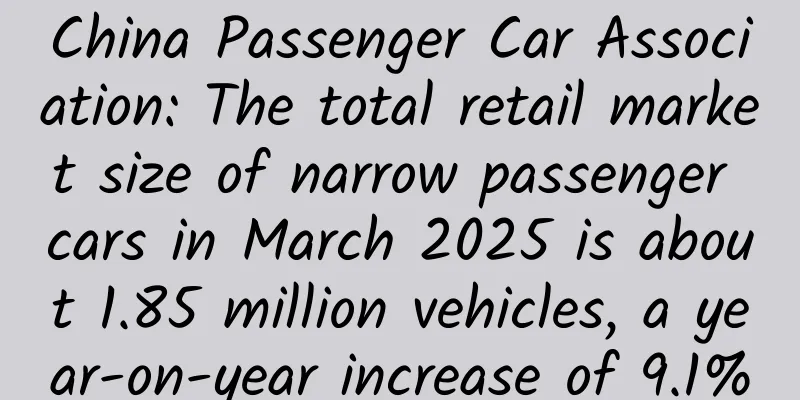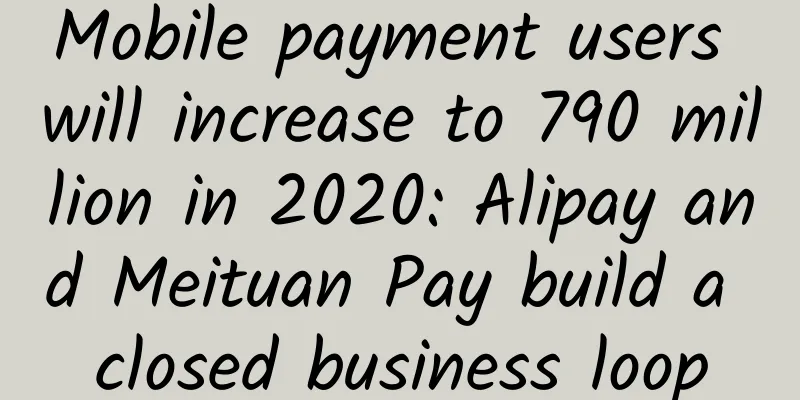Yu Yongfu: The Internet makes you run faster, but it is not the Internet that is the soul

|
In 2014, the term "market-to-dream rate" reached a peak in public opinion. It seems that all traditional businesses can be multiplied by 10 times by adding the adjective "Internet": "Internet mobile phones", "Internet cars", "Internet catering"... Especially for entrepreneurs, it can become a good story from the perspective of investment and financing, and increase valuation, so we call it "market-to-dream rate". The core reason behind this is that the Internet is changing from a sector to an industry. The Internet industry in a narrow sense refers to a virtual economy that has been developing for more than a decade and has become increasingly mature, entering a stable stage of "big opportunities become smaller, and small opportunities become larger." With the tide of the virtual economy becoming a physical entity, the Internet has also ushered in a new opportunity for industrial iteration. To use an analogy, the Internet has opened a door, breaking the information asymmetry in space and time, and the "non-Internet" industry behind the door has emerged. At this time, we seem to have seen a new blue ocean and feel that the opportunity is huge, because everyone has been competing in the red ocean of the Internet and has been ravaged for many years. Finally, there is a place to breathe, and everyone wants to get in. How do the people behind this door view the Internet? They say these people are "a scourge of monsters" who don't follow the rules. Mobile phones and televisions don't make money anymore, so what are you going to do? “Everyone wants to revolutionize XX industry with ‘Internet thinking’”. This is the mainstream atmosphere I feel from public opinion. “Non-Internet” is the core competitiveness of the future It is at this point in time that I think we should stay calm and think carefully about what we Internet people lack. In fact, if you can look at cross-border business from another perspective, you will find that the situation is different. Here are three examples: The first company is Alibaba . In 2014, Alibaba created the record of China's largest listed company by market value, bringing the term "market dream rate" to its extreme. The company's main business, e-commerce, is actually "electronics" plus "commerce". So which is more important, "electronics" or "commerce"? If "electronics" is more important, Tencent and Baidu are definitely not weak in "electronics", but after many years of hard work, they still have no breakthrough in e-commerce business. The core reason is that the competitiveness of "commerce" is insufficient. The second company is UC, which has created the record of the largest M&A integration in China so far. As one of the benchmark companies in the field of mobile Internet, our understanding of mobile Internet is "Internet" plus "mobile communication". In the industrial transformation from PC Internet to mobile Internet, the companies that can make it out are actually those that have a better understanding of "mobile communication" than their competitors. For example, why is UC so persistent in using cloud computing architecture to make browsers? The reason is very simple, because we understand a law of mobile communications: wireless is always limited, and wired is always unlimited. And cloud computing can maximize the utilization of limited resources. The third is Xiaomi , which keeps breaking records . Xiaomi has set a valuation record for non-listed Internet companies in China, even surpassing JD.com, which has already gone public. In the field of Internet mobile phones, BAT, including 360 , have all made mobile phones. Are their Internet companies weaker than Xiaomi? Not necessarily. I think the core reason why Xiaomi can stand out is that they have a deeper understanding of mobile phones than other Internet companies. From the above examples, we can see that although everyone started from the Internet, the final breakthrough in core competitiveness was in the "non-Internet". So today we are facing huge cross-border opportunities, and we should think that the Internet will become more and more a standard, becoming an attributive rather than a subject. Just like more than ten years ago, typing was still a profession within the company, but now this ability has become very common and no longer a core competitiveness. In the future, when the Internet is thoroughly popularized in all walks of life, the real core battlefield will shift to the "non-Internet" field. Internet and non-Internet: each has its own role Of course, this does not mean that Internet thinking is not important. On the contrary, to succeed in cross-border business, you must have both Internet and non-Internet genes. The problem that Internet companies have to solve is how to enter the real economy, while non-Internet companies have to think about how to go Internet-based. Without either one, there is no hope. In the end, it is a question of how to build both capabilities. In fact, every entrepreneur is actually striving for two things: run fast and run for a long time. Internet capabilities make cross-border businesses run faster. Because the first law of the Internet is the free economy, the product is free at the beginning to ensure that the threshold for users to use is low enough, and then quickly follow up and iterate based on feedback, using new technologies and new models to improve user experience and quickly expand the scale. Therefore, the Internet is an indispensable way of thinking. To put it in a metaphor, it is the "flesh" of a person, which is responsible for making you "run faster." But "running fast" does not necessarily lead to final success. In the end, a business still depends on who can "run for a long time" and whether they have a "soul" - that is, the grasp and understanding of the professional capabilities of those (traditional) businesses. This is true in many fields such as e-commerce, Internet finance, and Internet cars. Last year, Mr. Lei gave me a Tesla. After driving it, I felt that the Internet capabilities were sufficient, but the professional capabilities in the automotive field were not enough. They needed to be strengthened to truly develop this new type of car into a long-term industry. This is also the fundamental reason why I had many new experiences after joining AutoNavi last year. The LBS business is a cross-border integration of the Internet and maps. In the so-called "traditional field" of maps, AutoNavi has a very large team and layout. For example, aircraft is an aerial data collection device. Internet companies generally focus on light assets. It is hard to imagine that there are companies that need to use aircraft for business. But this is actually where AutoNavi’s real long-term competitiveness lies. In the past, AutoNavi suffered many hidden losses in the Internet field, and did not reflect many of our existing advantages. Therefore, what AutoNavi needs to do now is to build a team of talents in the two fields of Internet and map, and use the Internet as a "body" and "thinking" to further develop the strengths of map as a "soul" - after all, in the long run, when the Internet becomes a basic capability, map data will be the biggest competitive difference. In general, it can be summed up in one sentence: "Don't let your body lose your soul." Please keep respect for non-Internet fields. When we Internet people enter these non-Internet fields, we need to humbly and seriously learn about the understanding, ability, and execution of these industries. AMAP’s English name is “AMAP”, which implies that AMAP’s business is to focus on making “one map”. The fundamental reason is that we have enough awe for the professional field of maps and know that this is where the real soul lies. As a winner of Toutiao's Qingyun Plan and Baijiahao's Bai+ Plan, the 2019 Baidu Digital Author of the Year, the Baijiahao's Most Popular Author in the Technology Field, the 2019 Sogou Technology and Culture Author, and the 2021 Baijiahao Quarterly Influential Creator, he has won many awards, including the 2013 Sohu Best Industry Media Person, the 2015 China New Media Entrepreneurship Competition Beijing Third Place, the 2015 Guangmang Experience Award, the 2015 China New Media Entrepreneurship Competition Finals Third Place, and the 2018 Baidu Dynamic Annual Powerful Celebrity. |
<<: Will Android become the next Microsoft operating system?
>>: Why do we still need POS machines when mobile payment is on the rise?
Recommend
Does PFAS in jackets affect fertility? Experts: No need to panic about products that meet national standards
Recently, the topic of "perfluorinated and p...
Inventory of classic running video types in information flow
Everyone should be familiar with the financial in...
How long is one meter? Have you ever thought about this question seriously?
Source: China Science and Technology Museum The u...
What happened to the girl from Liangshan, Sichuan, who returned to her hometown to teach after graduation? Why did the girl from Liangshan, Sichuan return to her hometown to teach after graduation?
What happened to the girl from Liangshan, Sichuan...
These things that we think are signs of good health are actually wrong!
Many people judge their health status based on th...
How to view Didi’s friend link exchange log? What is the use of chain change log?
How to view Didi’s friend link exchange log? What...
What to do if the retention rate of the live broadcast room is low? How to improve the retention rate of live broadcast room
I believe that many new anchors have faced such a...
Mijia direct-drive washer-dryer: 10kg laundry machine, one-touch smart home connectivity
In the field of washing machines dominated by man...
Why can the induction cooker heat up the hot pot, but people’s hands don’t get hot when they put them on it?
When you go to a hotpot restaurant to eat hotpot,...
Bad example: Five steps to make your website slow down
Of course, we all want to provide a satisfying us...
No wonder I can’t wear a turtleneck in winter! I found the cause of my long-standing problem...
Today, #Why do some people feel uncomfortable whe...
Are movies adapted from novels necessarily inferior to the originals? Here are some counter-examples!
In 1999, young Neo in "The Matrix" face...
Why is the promotion still ineffective even though the advantages are used as selling points?
We often say that before promoting a new product,...
Save your life! What should I do if I get frostbite in Harbin?
Review expert: Zhang Yuhong, chief physician of t...
In-depth analysis of information flow delivery to discover the secret of rapid ROl growth!
What exactly is advertising, trying to convince y...









